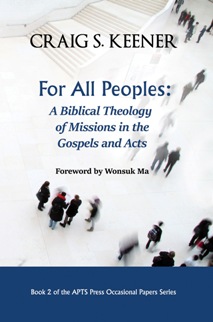Craig Keener: For All Peoples
 Craig S. Keener, For All Peoples: A Biblical Theology of Missions in the Gospels and Acts (Baguio City, Philippines: Asia Pacific Theological Seminary Press, 2020), 122 pages, ISBN 9798665145082.
Craig S. Keener, For All Peoples: A Biblical Theology of Missions in the Gospels and Acts (Baguio City, Philippines: Asia Pacific Theological Seminary Press, 2020), 122 pages, ISBN 9798665145082.
Dr. Craig Keener is a widely recognized New Testament scholar. He is perhaps best known for the biblical commentaries he has written. He has won the respect of believers from many different church traditions. His books are characterized by meticulous research, great detail, and thorough documentation. This current volume is a bit different than most of Keener’s other work. The difference is that this book is short! However, even though it is short it is not lacking in substance.
The book is comprised of: a preface, forward, endorsements, introduction, and five chapters. The chapters, for the most part, are based on lectures Dr. Keener gave in different places in 2002, 2008, and 2009 (page 1). The lectures he gave at Asia Pacific Theological Seminary in 2009 were put in article form and were first published in the Asian Journal of Pentecostal Studies (pages 1-2). Chapter 5 of the book was also published in the journal but at an earlier date, in 2008. For All Peoples is a compilation of the articles which were published in the journal over ten years ago (pages 1-2).
The first chapter focuses on Matthew 28:18-20, the text that is commonly referred to as “The Great Commission.” The author points out that the one command is to “make disciples” (page 3). He further writes that this mission includes: “going,” “baptizing,” and “teaching” (page 3). Keener plainly states that discipleship is not just evangelism (page 14). There must be further instruction or training for those who come to faith in Christ (pages 14-15). He further elaborates on what a disciple of Jesus is to value (pages 16-19). One truth that emerges in this chapter is that the gospel message is meant to be shared cross-culturally.
We cannot be successful in Christ’s mission without His power.
The third chapter is given to the missiology of Luke as found in Acts 1 and 2. The author provides a very homiletical outline of the major themes related to Pentecost. He writes about: “The Promise of Pentecost” (pages 48-55), “The Preparation for Pentecost” (pages 55-57), “The Proofs of Pentecost” (pages 57-62), “The Peoples of Pentecost” (pages 62-64), “The Prophecy of Pentecost” (pages 65-67), “The Preaching of Pentecost” (pages 68-69), “The Purpose of Pentecost” (pages 69-72). One point he states plainly near the beginning and end of this chapter is that we cannot be successful in Christ’s mission without His power (page 48, 72).
Believers are meant to be missional people. God’s intent is that Christians take the initiative and engage the world with God’s message.
The last chapter looks at Acts 16:8-10. Here Keener examines information pertinent to the gospel crossing over from Asia into Europe. Unlike the other chapters, the content of this chapter deals more with historical information from outside the Bible than with the biblical text.
For All Peoples is a valuable contribution to the literature on missional theology.
Though For All Peoples is brief it has a lot to offer. It is thoroughly biblical and reminds the church, through multiple biblical texts, of its mission. In the foreword, Dr. Wonsuk Ma said that Keener’s chapter on Pentecost (Chapter 3) is important for the whole church (page vii). Pentecostals in particular may gravitate toward this chapter. This book is a valuable contribution to the literature on missional theology.
Reviewed by John Lathrop
Preview For All Peoples: https://books.google.com/books?id=HHH8DwAAQBAJ
Publisher’s page: https://wipfandstock.com/for-all-peoples.html
Category: Biblical Studies, Fall 2020


